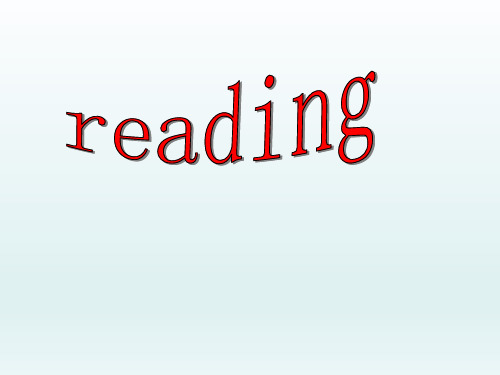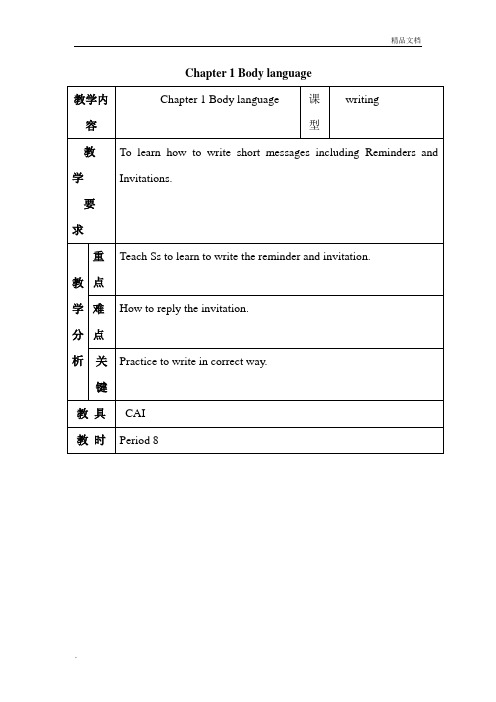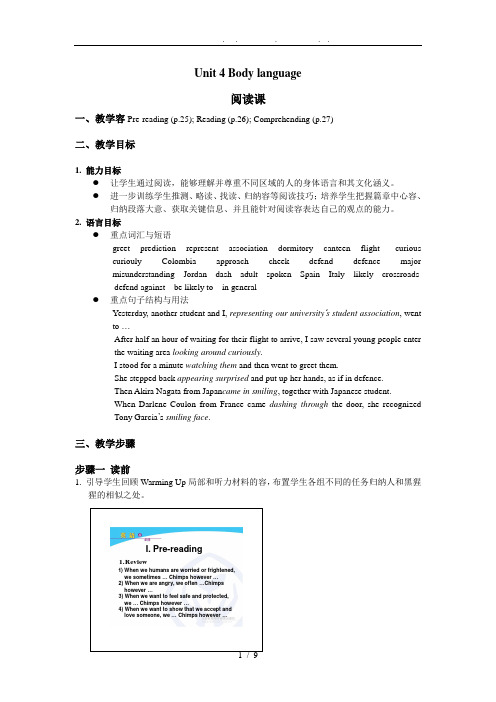人教新课标高中英语必修4第四单元Module 4 Unit 4 Body language早读材料和检测含答案-2019年教学文档
- 格式:doc
- 大小:45.51 KB
- 文档页数:4



人教新课标英语必修4全册教案(Unit 4 Body Language)一、教学目标1.掌握与身体语言相关的词汇和短语;2.学习运用不同的身体语言表达自己的情感和意图;3.能够理解并能运用与身体语言相关的语法结构;4.培养学生的说、听、写、读的能力;5.培养学生的团队合作与表达能力。
二、教学准备1.教材:人教新课标英语必修4全册;2.PowerPoint 展示课程教学内容;3.音频设备。
三、教学计划第一课时:词汇与短语教学1. 导入(5分钟)通过展示一些身体语言的图片,引发学生们对身体语言的兴趣,并让他们猜测图片中人物的情感和意图。
2. 新词学习(15分钟)在讲解的过程中,通过多媒体展示相关的图片或动作以加深学生们的理解与记忆。
- Body language:身体语言 - Gesture:手势 - Facial expression:面部表情 - Posture:姿势 - Maintain eye contact:保持眼神交流 - Nod:点头 - Shake hands:握手 - Hug:拥抱 - Bow:鞠躬 - Smile:微笑3. 短语学习(15分钟)•Get along with:与…相处融洽•Make friends with:与…交朋友•Show respect for:对…表示尊敬•Be fond of:喜欢•Play a role:起作用•Be ashamed of:以…为羞耻•Be confident in:对…有信心•Have a positive attitude:持积极态度•Pay attention to:注意4. 听力练习(15分钟)播放相关录音,要求学生根据所听内容填写相应的单词或短语。
可以将答案呈现在 PowerPoint 上进行批改,同时让学生自己检查正确率。
5. 小结(5分钟)对所学的新词和短语进行小结。
鼓励学生积极参与,对不清楚的地方进行反复澄清。
第二课时:语法与句型教学1. 导入(5分钟)通过一个与身体语言有关的小故事或情景,引发学生们对身体语言的思考和讨论。


Unit 4 Body language阅读课一、教学容Pre-reading (p.25); Reading (p.26); Comprehending (p.27)二、教学目标1. 能力目标●让学生通过阅读,能够理解并尊重不同区域的人的身体语言和其文化涵义。
●进一步训练学生推测、略读、找读、归纳容等阅读技巧;培养学生把握篇章中心容、归纳段落大意、获取关键信息、并且能针对阅读容表达自己的观点的能力。
2. 语言目标●重点词汇与短语greet prediction represent association dormitory canteen flight curiouscuriouly Colombia approach cheek defend defence majormisunderstanding Jordan dash adult spoken Spain Italy likely crossroadsdefend against be likely to in general●重点句子结构与用法Yesterday, another student and I, representing our university’s student association, wentto …After half an hour of waiting for their flight to arrive, I saw several young people enterthe waiting area looking around curiously.I stood for a minute watching them and then went to greet them.She stepped back appearing surprised and put up her hands, as if in defence.Then Akira Nagata from Japan came in smiling, together with Japanese student.When Darlene Coulon from France came dashing through the door, she recognizedTony Garcia’s smiling face.三、教学步骤步骤一读前1. 引导学生回顾Warming Up局部和听力材料的容,布置学生各组不同的任务归纳人和黑猩猩的相似之处。

高一英语同步练习:必修4 Unit 4 Body Language第4课时Using language基础练习本单元重点知识归纳总结:一、重点词汇:(写出汉意及词性)1. represent______________2 .curious _______________3 .defend______________4 . approach ______________5. be likely to______________6 .in general______________7. at ease ______________8.lose face ______________9 .turn one’s back to______________二、重点句式:1. prohibition and warning(禁令和警告):Do not...; Stop! ;Keep away from...;Always stay...;Watch out! Look out! Go away. Don’t enter hereBe careful when..., Come here.You may not...You will be fined...,Don’t smoke here. Don’t slip;2.obligation(义务和责任)You must...,You should never...,You will be...,You will have to...,You will need to...,We ought to...,He’s supposed to...(书中supposed 第一个s是大写)三、课文重点句型:1 .Not all cultures greet each other the same way, nor arethey comfortable in the same way with touching or distance between people.1. 各种文化背景下的人互致问候的方式不尽相同,身体接触和相互间距的程度也不尽相同。
人教新标英语必修4全册教案(Unit 4Bd Language)Unit4BdLanguage Partne:TeahingDesignTeahinggals1TargetLanguagea重点词汇和短语isunderstand,siilar,faial,expressin,agreeent,an,hes t,gesture,adult,punishb重点句型或交际用语Atutthefllingeanings,pleasePleaseguesshatIeanPlease shtheatins,usingbdlanguageNitisurturntshtheatin/ges turePleaseuseeitherspenrdsrbdlanguagetexpressuridea sPleaseusebthspenrdsandbdlanguagetexpressurideas2Ab ilitgalsaEnablethestudentstunderstandhataertaingestureftheb dlanguageeansinagivensituatinbEnablethestudentstatu tseeanings,requireents,requestsrsituatinsgiveninthe targetlanguageEnablethestudentstexpressiththetarget languagetheeaningsgiveninbdlanguage3Learningabilitg alsaHelpthestudentslearnhtexpresstheselvesinbdlangu agehenneededbHelpthestudentsunderstandthershenbdlan guageisbeingusedTeahingiprtantpintsaTeahthestudentshtunderstandbdlanguageusedindiffere ntuntriesrulturesasellasindifferentasinsbTeahthestu dentshtusebdlanguageinthestapprpriateasinsTeahingdi ffiultpintsaEnablethestudentstrealizetheiprtanefbdl anguageinuniatinsthatlittlernisunderstandingaurbLet thestudentsnthatthereisbthpsitivebdlanguageandnegat ivebdlanguageTeahingethdsaIndividualr,pairrandgruprbAtingutbiitatin,ierithge sturesandbdveentTeahingaidsAputer,apretrandsepituresTeahingpredures≈asThefi rstperidreadingAisThelpstudentsdevelptheirreadingab ilitThelpstudentslearnabutbdlanguagePreduresIaringu paringupbatingLatthelistfinterpretatinntherightside fthehartPerfrtheatinrthennverbalbehaviurntheleftsid eExaplesfBdLanguagearingupbdefining—hatisbdlanguage?IIPre-reading1LingandsaingLattheaninthepiturebelhatdeshesatubhisb dlanguage?Basiall,hthedIn?r,Idn’tnnthin!Theshuldersarehunhedandthehandsarepensignif ingabigquestinar2TalingandsharingBdlanguageisthequiet,seretandstperf ullanguagefall!Ardingtexperts,urnn-verballanguageuniatesabut0%fhat erealleanhilerdstheselvesntributeaere7%urbdiessendutessagesnstantlandftenedn'tregnizethate 'reuniatingaltrethanerealizeurunderstandingandusefn n-verbaluesinfaialexpressinarefailiartusnearlfrbirt hIIIReading1ReadingaludtthererdingNpleaselistenandreadaludtther erdingfthetextUNIATIN:NPRBLE?Paattentinttheprnuniat infeahrdandthepausesithineahsenteneIillplathetapeti eandushallreadaludtie,t2ReadingandunderliningNextuaretreadandunderlineallth eusefulexpressinsrllatinsinthepassageptheturntebaft erlassasher3ReadingtidentifthetpisentenefeahparagraphNextuarets ithetexttidentifthetpisentenefeahparagraph4ReadingandtransferringinfratinReadthetextagaintplet ethetablehereishe/shefr?hatdeshe/shedhenhe/sheeetse neattheairprtfrthefirsttie?NaeuntrAtineaningrGariau liaSithAhedAzizadaeulnReadingandunderstandingdiffiultsentenesAsuhavereadt hetextties,uansureltellhihsentenesarediffiulttunder standNputurquestinsnerningthediffiultpintstetheteah er6ReadingandtranslatingNit’stiettranslatethetextinthinese,sentenebsentenehillb ethefirsttdit?IVlsingdnlsingdnbdingexerisesTendthel essnuaretdtheprehendingexerisesN1and2npage26and27ls ingdnbheinghesefthefllingbasinn-verbaluesandu'llreg nizethatualreadspeaandtranslateuhfthelanguage“I’surprised!”I’shed!”“I’sad!”ThesendperidLearningabutLanguageIaringuparingupbdisveringuseful rdsandexpressinsTurntpage27anddexerisesN1,2,3and4fi rstheuransersagainsturlassates’IILearningabutgraar1ReadingandthiningTurntpage2andreadithethetextfUNIAT IN:NPRBLE?Asureadalng,paattentinttheusesfThe~ingfra stheAttribute≈Adverbial2DingexerisesN1and2npage29Turntpage29DexerisesN1and2。
Module 4 Unit 4 Body language (Consolidation ) 班级__________ 姓名____________ 学号_____________ Ⅰ. Words1. represent vt.代表;象征2. approach vt./n.接近;走近;方法3. statement n.陈述;说明4. greet vi./vt..迎接;问候5. association n.社团;联系;联想6. dormitory n.宿舍7. canteen n.食堂8. flight n.飞行;航班9. curious adj.好奇的10. cheek n.面颊11. major adj.主要的12. misunderstand vt.误解;误会13. dash vi.猛冲;突进14. adult n./adj.成人;成人的15. spoken adj.口语的16. crossroads n.十字路口17. facial adj.面部的18. function n./vi.作用;功能;运转19. truly adv.真实地20. false adj.错误的;假的21. anger n.怒气;怒火22. fist n.拳头23. yawn vi.打呵欠24. subjective adj.主观的25 . hug vi./vt.拥抱26. rank n.等级;军衔27. cassette n.磁带Ⅱ. Phrases1. student association 学生会2. dormitory and canteen宿舍食堂3. greet sb 问候某人4. body language身势语5. introduce sb/sth to sb 向某人介绍某人/物7. kiss sb on the cheek亲某人脸颊8. in defence/ defend against 自卫9. a major misunderstanding 大的误会10. shake one’s hand 摇头11. on the contrary相反的12. Muslim countries 穆斯林国家14. express one’s feeling表达一个人的情感15. be likely to do很可能做……16. in general 总的说来17. a world of cultural crossroads文化交融的世界18. physical distance, action or posture身体距离,动作和姿势20. facial expression面部表情21. at ease安逸;自由自在23. lose face丢脸24. turn one’s back to背对着;背弃Ⅲ. Sentences1.如果有必要, 我们可以更改旅行日期。
(省略句)If (it is) necessary, we can change the dates of our trip.2.那不是一件好事。
相反, 是个巨大的错误。
(on the contrary)It wasn’t a good thing. On the contrary, it was a huge mistake.3.他在会议上一句话也没说。
(倒装句)Not a single word did he say at the meeting.4.他一出家门, 天就开始下雨。
(no sooner…than)No sooner had he left home than it began to rain.5.拥抱你的老板或老师很可能是不妥当的。
(it’s probably not a good idea to ….)It is probably not a good idea to give a hug to a boss or teacher.6.这个女孩这么早结婚真是一件令人惊讶的事。
(It’s surprising that…)It’s really surprising that the girl got married so early.7他是个有才华的音乐家以及优秀的舞蹈演员。
(as well as)He is a talented musician as well as a great dancer.7.他对功课的态度不端正。
(have a bad attitude towards)He has a bad attitude towards his schoolwork.8.不注视正在同你说话的人是不礼貌的。
(look away from)It’s bad manners to look away from the person who is speaking to you.10. 他们对家庭中的长辈非常尊敬。
(be respectful to)They are very respectful to their elderly family members.Ⅳ.PassageYesterday, another student and I went to CIA to meet the international students. After half an hour of waiting for their flight to arrive, I saw several young people enter the waiting area looking around curiously. The first to arrive was Tony from Colombia. He approached Julia, touched her shoulder and kissed her on the cheek! She stepped back as if in defence. I guessed there was probably a misunderstanding. As I get to know more international friends, I’ve learned that people communicate with spoken language and they also express their feelings using unspoken “language”. In general, studying international customs can certainly help avoid difficulties in today’s world of crossroads.Ⅳ. 语篇背诵身体语言是由人的肢体动作引起的,可以传递许多信息。
握手是身体语言中最常见的一种。
我们在与人交流沟通时可以凭借对方的身体语言来探索他内心的秘密。
对方也同样可以通过身体语言了解到我们的真实想法。
通过学习身体语言,有助于人们避免因文化差异而产生的误解。
Body language is expressed by means of movements of legs and hands, which can convey a lot of messages. Of all the types of body language, shaking hands is the most common one. When we communicate with somebody, we can explore into his thoughts deep in his mind depending on his body language. Similarly, other people can also know our true thoughts through our body language. By learning body language, it is helpful for people to avoid misunderstandings caused by the cultural differences.Unit 4 Body Language (Module 4) Consolidation 班级_______ 姓名____________ 学号_______ 分数_________Ⅰ.单词拼写(20分)1. He is a __________________(好奇的) boy who is always asking questions.2. Ray, you must have ______________(误会)her! Joan would never say something like that.3. After class the students run to the ____________________ (食堂) to have dinner.4. He is being very impatient, which you can see from his ____________(面部的) expression.5. They ________________(奔向,猛冲) off to Paris for a couple of days6. The picture r_______________ (代表)a hunting scene in which there is an ancient king.7. Our English teacher told us that he _______________ (主修) in mathematics and physicswhen at college, which surprised us.8. As you a________________(靠近)the town the first building you see is the church.9. Children must be companied by an ______________ (成年人) in this theme park.10. The plan was ________________(普遍地) welcomed.II. 选词填空(30 分)A.英汉词组互译(10分)1. be likely to 6. 相反地2. in general 7. 丢脸3. turn one’s back to 8. 握某人的手4. feel at ease 9. 保卫……以免受5. not all 10. 问候某人,迎接某人B. 用以上词组的正确形式完成句子(20分)1. Whenever I visit my grandparents, they always ________________ with a hug.2. The student _____________________ be punished by his teacher because of being late.3. It isn’t polite for you to _______________________ other people when talking with them.4. _______________, people don't like to be made fun of.5. It wasn't a good thing. _________________, it was a huge mistake.6. ________________ my friends like football. Some like basketball.7. The doctor tried his best to make the injured ______________________.8. It's really a shame for a government to ____________________in public like that.9. I saw them ____________________ with each other when they were introduced.10. They tried to ____________ themselves _____________ the enemy.Ⅲ. 根据括号内的提示将下列句子翻译成英语(20分)1.他在会议上一句话也没说。